Related Research Articles
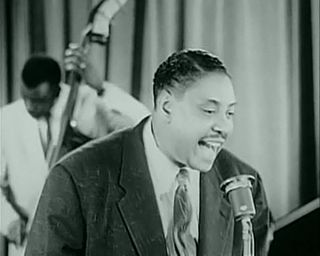
Rhythm and blues, frequently abbreviated as R&B or R'n'B, is a genre of popular music that originated within African-American communities in the 1940s. The term was originally used by record companies to describe recordings marketed predominantly to African Americans, at a time when "rocking, jazz based music ... [with a] heavy, insistent beat" was becoming more popular. In the commercial rhythm and blues music typical of the 1950s through the 1970s, the bands usually consisted of a piano, one or two guitars, bass, drums, one or more saxophones, and sometimes background vocalists. R&B lyrical themes often encapsulate the African-American history and experience of pain and the quest for freedom and joy, as well as triumphs and failures in terms of societal racism, oppression, relationships, economics, and aspirations.

Bill Haley & His Comets was an American rock and roll band formed in 1947 and continuing until Haley's death in 1981. The band was also known as Bill Haley and the Comets and Bill Haley's Comets. From late 1954 to late 1956, the group recorded nine Top 20 singles, one of which was number one and three that were Top Ten. The single "Rock Around the Clock" was the best-selling rock single in the history of the genre and maintained that position for several years.
Instrumental rock is rock music that emphasizes instrumental performance and features very little or no singing. Examples of instrumental music in rock can be found in practically every subgenre of the style. Instrumental rock was most popular from the mid-1950s to mid-1960s, with artists such as Bill Doggett Combo, The Fireballs, The Shadows, The Ventures, Johnny and the Hurricanes and The Spotnicks. Surf music had many instrumental songs. Many instrumental hits had roots from the R&B genre. The Allman Brothers Band feature several instrumentals. Jeff Beck also recorded two instrumental albums in the 1970s. Progressive rock and art rock performers of the late 1960s and early 1970s did many virtuosic instrumental performances.
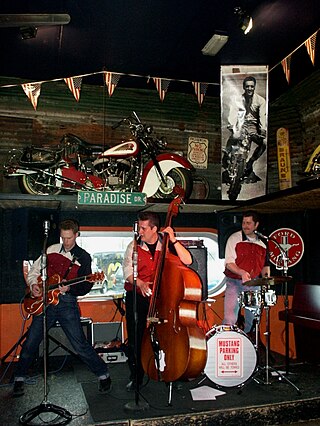
Rockabilly is one of the earliest styles of rock and roll music. It dates back to the early 1950s in the United States, especially the South. As a genre it blends the sound of Western musical styles such as country with that of rhythm and blues, leading to what is considered "classic" rock and roll. Some have also described it as a blend of bluegrass with rock and roll. The term "rockabilly" itself is a portmanteau of "rock" and "hillbilly", the latter a reference to the country music that contributed strongly to the style. Other important influences on rockabilly include western swing, boogie-woogie, jump blues, and electric blues.

John Joseph Burnette was an American singer and songwriter of rockabilly and pop music. In 1952, Johnny, his brother, Dorsey Burnette, and their mutual friend Paul Burlison, formed the band that became known as the Rock and Roll Trio. His career was cut short on August 14, 1964, when he drowned following a boat accident, aged 30.

The Ventures are an American instrumental rock band formed in Tacoma, Washington, in 1958, by Don Wilson and Bob Bogle. The band, which was a quartet for most of its existence, helped to popularize the electric guitar across the world during the 1960s. While their popularity in the United States waned in the 1970s, the group remains especially revered in Japan, where they have toured regularly. The classic lineup of the band consisted of Wilson, Bogle, Nokie Edwards, and Mel Taylor (drums).

Thompson Twins were a British pop band, formed in 1977 in Sheffield. Initially a new wave group, they switched to a more mainstream pop sound and achieved considerable popularity during the early and mid-1980s, scoring a string of hits in the United Kingdom, the United States, and around the world. In 1993, they changed their name to Babble, to reflect their change in music from pop to dub-influenced chill-out. They continued as Babble until 1996, at which point the group permanently broke up.

William Patton Black Jr. was an American musician and bandleader who is noted as one of the pioneers of rock and roll. He played in Elvis Presley's early trio, The Blue Moon Boys. Black later formed Bill Black's Combo.
Boogie is a repetitive, swung note or shuffle rhythm, "groove" or pattern used in blues which was originally played on the piano in boogie-woogie music. The characteristic rhythm and feel of the boogie was then adapted to guitar, double bass, and other instruments. The earliest recorded boogie-woogie song was in 1916. By the 1930s, Swing bands such as Benny Goodman, Glenn Miller, Tommy Dorsey and Louis Jordan all had boogie hits. By the 1950s, boogie became incorporated into the emerging rockabilly and rock and roll styles. In the late 1980s and the early 1990s country bands released country boogies. Today, the term "boogie" usually refers to dancing to pop, disco, or rock music.

Paul Burlison was an American pioneer rockabilly guitarist and a founding member of The Rock and Roll Trio. Burlison was born in Brownsville, Tennessee, where he was exposed to music at an early age. After a stint in the United States Military, Burlison teamed up with Johnny and Dorsey Burnette to form The Rock and Roll Trio. The band released several singles, but failed to attain chart success. Paul is sometimes credited with being the first guitarist to intentionally record with a distorted electric guitar on the 1956 recordings, "Lonesome Train on a Lonesome Track" and "Honey Hush." The trio disbanded in the fall of 1957 and Burlison moved back to Tennessee to start a family. There he started his own electrical subcontracting business which he ran faithfully for twenty years, taking a break when the trio reunited in the early 1980s. He released his only solo album in 1997, which received positive reviews. Burlison remained active in the music scene until his death in 2003.
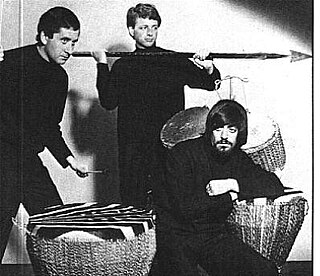
The Strangeloves were a band created in 1964 by the New York-based American songwriting and production team of Bob Feldman, Jerry Goldstein, and Richard Gottehrer. They initially pretended to be from Australia. The Strangeloves' most successful singles were "I Want Candy," "Cara-Lin", and "Night Time".
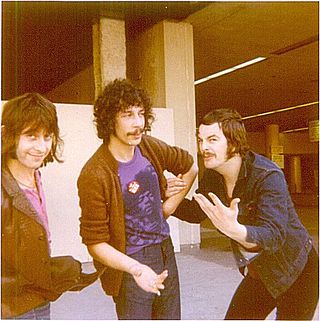
Ashton, Gardner and Dyke were a British rock trio, most popular in the early 1970s. They are best remembered for their song, "Resurrection Shuffle", a transatlantic Top 40 one-hit wonder in 1971.
B. Bumble and the Stingers was an American instrumental ensemble in the early 1960s, specializing in rock and roll arrangements of classical melodies. The band's biggest hits were "Bumble Boogie", which reached number 21 in the US, and "Nut Rocker", which reached number 1 in the UK Singles Chart in 1962. The recordings were made by session musicians at Rendezvous Records in Los Angeles. When their recordings became successful a touring group was formed, led by R. C. Gamble as "Billy Bumble".
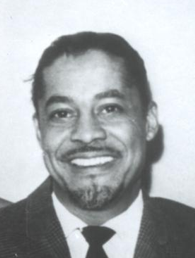
Ernest Aaron Freeman was an American pianist, organist, bandleader, and arranger. He was responsible for arranging many successful rhythm and blues and pop records from the 1950s to the 1970s.

"Train Kept A-Rollin'" is a song first recorded by American jazz and rhythm and blues musician Tiny Bradshaw in 1951. Originally performed in the style of a jump blues, Bradshaw borrowed lyrics from an earlier song and set them to an upbeat shuffle arrangement that inspired other musicians to perform and record it. Johnny Burnette and the Rock and Roll Trio made an important contribution in 1956 – they reworked it as a guitar riff-driven song, which features an early use of intentionally distorted guitar in rock music.

"Tube Snake Boogie" is a song by American rock band ZZ Top from their 1981 album El Loco. It was released as a single the same year and reached No. 4 on the Billboard Mainstream Rock chart.

"Hide Away" or "Hideaway" is a blues guitar instrumental that has become "a standard for countless blues and rock musicians performing today". First recorded in 1960 by Freddie King, the song became a hit on the record charts. It has been interpreted and recorded by numerous blues and other musicians and has been recognized by the Rock and Roll Hall of Fame and the Grammy Hall of Fame.

Jean Beauvoir is an American singer, bassist, guitarist, multi-instrumentalist, songwriter, producer and entertainment executive. He came to prominence in the early 1980s with the punk group the Plasmatics and went on to work with Little Steven, Kiss, the Ramones and as a solo artist.

"Guitar Boogie" is a guitar instrumental recorded by Arthur "Guitar Boogie" Smith in 1945. It was one of the first recordings in the style later dubbed "hillbilly boogie" to reach a widespread audience, and eventually sold nearly three million copies. It was the first guitar instrumental to climb the country music charts, and then crossover and also gain high rankings on the popular music charts. "Guitar Boogie" has been interpreted and recorded by a variety of musicians. It is among the songs discussed as the first rock and roll record.

"Apache" is a song written by Jerry Lordan and first recorded by Bert Weedon. Lordan played the song on ukulele to the Shadows while on tour and, liking the song, the group released their own version which topped the UK Singles Chart for five weeks in mid-1960. The Shadows' guitarist Hank Marvin developed the song's distinctive echo and vibrato sound. After hearing the Shadows' version, Danish guitarist Jørgen Ingmann released a cover of the song in November 1960 which peaked at number 2 on the Billboard Hot 100 in the US.
References
- 1 2 3 Colin Larkin, ed. (2002). The Virgin Encyclopedia of Fifties Music (Third ed.). Virgin Books. p. 471. ISBN 1-85227-937-0.
- ↑ Mark Jaffe (1994). "Frank F. Virtue, 71, Musician Of Many Eras". The Inquirer. Retrieved 13 November 2013.
- 1 2 3 The Virtues, AllMusic
- 1 2 Billboard Singles, Allmusic
- ↑ Society's Child (Self-titled album). Virtue Studio Records. Liner notes.